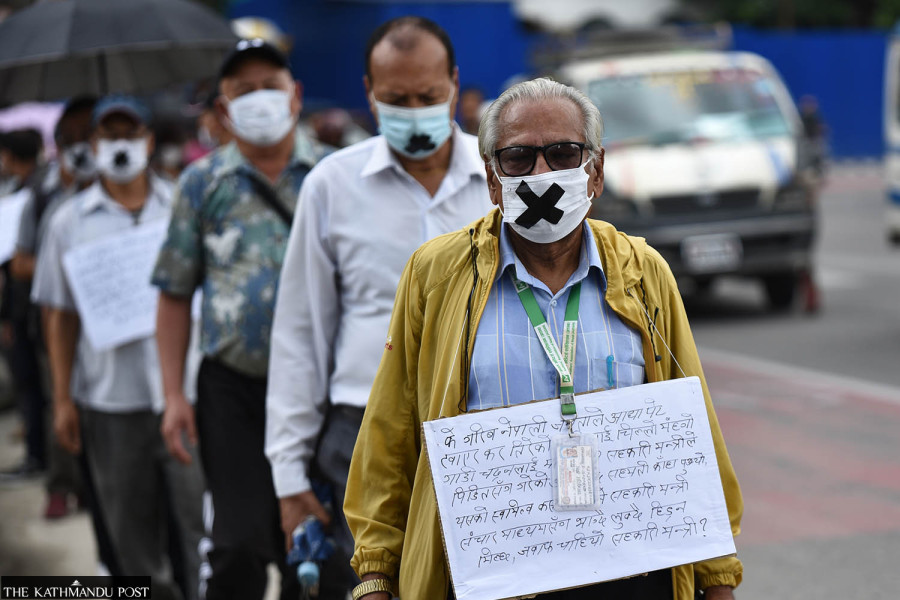National
Ordinance fails to reassure cooperatives victims
Those who lost savings question compensation plans, and possible use of their funds to finance regulatory body.
Purushottam Poudel
Even though the government has issued an ordinance to address cooperative-related issues, including the widespread fraud that has affected thousands of depositors, the National Campaign for Protection of Cooperative Depositors remains doubtful about the effectiveness of the ordinance.
The Cabinet meeting on December 24 decided to introduce an ordinance amending ‘some Nepal laws’ including one on cooperatives. It was forwarded to President Ramchandra Paudel, who issued it on December 29. The amended law requires that cooperatives set standards for proportionately returning members’ savings if full payment is not immediately possible.
The ordinance stipulates that a National Cooperative Regulatory Authority be set up to regulate savings and credit cooperatives, abolishes the National Cooperative Development Board Act 1992, and prioritises the return of up to Rs500,000 in depositor savings.
However, due to disagreements over the ordinance, the National Campaign for Protection of Cooperative Depositors had to organise a press conference on January 6. The campaign has also submitted a 16-point suggestion to the government to review the ordinance in order to effectively address their problems.
“Though the establishment of the National Cooperative Regulatory Authority is a positive step, the ordinance is not clear on how it will address the problems faced by the depositors,” said Kushluv KC, the campaign chair. “The ordinance could help in the long run, but it does not address the immediate problems of ordinary depositors.”
KC also claimed that the ordinance has disregarded several prior agreements reached between the campaign and the Ministry of Land Management, Cooperatives, and Poverty Alleviation. He argued that the ordinance does not specify what action(s) the government will take in the event of its failure to compensate cooperative victims even after seizing the assets of cooperative operators.
In the case of savings exceeding Rs500,000, the ordinance requires the concerned cooperative organisation to provide for repayment of members’ savings proportionally if full repayment is not possible at once.
Former finance minister Barshaman Pun, while presenting the fiscal budget for 2024-2025, had announced that the government would return up to Rs500,000 to the depositors of defunct cooperatives. However, the problem remains unresolved.
“What about depositors with savings exceeding the specified amount [Rs500,000]?” KC further questions. “Also, if the government is serious about repaying the depositors, why hasn’t the ordinance mentioned the timeframe for returning the money?”
Kashiraj Dahal, former chair of the Crisis-Ridden Cooperatives Management Committee, a government agency, says the regulatory authority will help address future problems, but stressed the need for the government to address the concerns of current depositors who have been defrauded.
“Those who embezzled cooperatives’ money may have sold their assets and fled the country,” Dahal said. “The government must assure depositors that their money is secure.”
Meanwhile, cooperative victims have alleged that the government intends to use the money from the cooperatives involved in misappropriating depositor funds to finance the operations of the National Cooperative Regulatory Authority.
“When cooperative victims are struggling to meet daily needs, how can the government justify using their money to fund the regulatory body?” questioned one member of the campaign.
But the Ministry of Land Management, Cooperatives and Poverty Alleviation spokesperson Ganesh Prasad Bhatta denies these allegations.
Article 110 of the cooperative ordinance states that expenses for managing the assets of crisis-ridden cooperatives will be covered by the cooperatives’ own assets.
“But this does not mean that the funds meant for repaying the depositors will be used to finance the operations of the regulatory body. Only after returning victims’ money will the expenditure be managed,” Bhatta added
“Let the ordinance be implemented first, and if the government feels the need, it will consider the campaign’s suggestions.”
As the ordinance has yet to be implemented, it would be premature for anyone to comment on its effectiveness, he said.
Starting Monday, the campaign’s activists also plan to visit the offices of all major political parties to submit their suggestions on the ordinance.
“If the government still does not address our concerns, we will make sure the issue gets internationalised. We will reach out to various international agencies in Kathmandu,” KC warned.
The ordinance prohibits individuals from becoming members of more than one cooperative organisation. And individuals who are already members of more than one cooperative organisation of similar nature are required to retain membership in only one within a year of the new law coming into effect.
The ordinance also classifies cooperatives into federal, provincial, and local levels and provides separate guidelines for issuing loans. Also, cooperative board members cannot serve for more than two terms. Currently, the term of a board member is two years.
Under the ordinance, cooperatives that primarily deal in savings and credits must now join the Deposit and Credit Protection Fund to protect members’ savings.
The ordinance amends some clauses of the Cooperative Act 2017 and the Nepal Rastra Bank Act 2002, as well as the Deposit and Credit Protection Fund Act 2016. The government introduced the ordinance as the parliament is currently not in session.




 9.12°C Kathmandu
9.12°C Kathmandu















